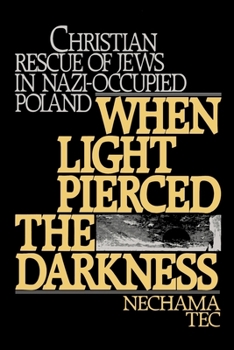When Light Pierced the Darkness: Christian Rescue of Jews in Nazi-Occupied Poland
Select Format
Select Condition 
Book Overview
Everyone knows the name of Anne Frank but few people remember anything about the people who sheltered her. Who were the rescuers and what motivated them to risk their lives for persecuted Jews? Clearly such people deserve to be remembered and honored. And clearly an understanding of their motivations may help us cultivate such behavior in our own day.
Focusing on such "righteous Christians," Tec, herself a survivor helped by Poles, vividly recreates what it was like to pass and hide among Christians and what it was like for Poles to rescue Jews. Concentrating on Poland, the Nazi center for Jewish annihilation, Tec amassed a vast array of published accounts, unpublished testimonies, and interviews, yielding case histories of over 500 Polish helpers, preserving for posterity the heroism of such people, and filling a significant gap in our knowledge of the Holocaust.
Focusing on such "righteous Christians," Tec, herself a survivor helped by Poles, vividly recreates what it was like to pass and hide among Christians and what it was like for Poles to rescue Jews. Concentrating on Poland, the Nazi center for Jewish annihilation, Tec amassed a vast array of published accounts, unpublished testimonies, and interviews, yielding case histories of over 500 Polish helpers, preserving for posterity the heroism of such people, and filling a significant gap in our knowledge of the Holocaust.
Format:Paperback
Language:English
ISBN:0195051947
ISBN13:9780195051940
Release Date:October 1987
Publisher:Oxford University Press
Length:288 Pages
Weight:0.95 lbs.
Dimensions:0.8" x 6.0" x 9.0"
Related Subjects
England Ethnic & National Europe Fairy Tales Folklore Folklore & Mythology History Humanities Irish Jewish Military Modern (16th-21st Centuries) Mythology & Folk Tales Poland Politics & Social Sciences Science Science & Math Science & Scientists Science & Technology Social Sciences Textbooks World World War IICustomer Reviews
3 ratings
Polish Rescuers of Jews Examined in Great Detail
Published by Thriftbooks.com User , 17 years ago
This study is very comprehensive, yet Tec acknowledges the possibility of a sampling bias (p. 235). Virtually all Polish Jews who survived the war had been helped by Poles (p. 72), most of whom had been strangers to them (p. 227, 233), and a significant fraction of whom held anti-Semitic beliefs (pp. 61-63; including the hard-core variety: Chapter 6). Emmanuel Ringelblum had supposed that members of the Polish middle class (small businessmen), supposedly desiring Jews' deaths in order to avoid repaying money owed them, would be the least prone to save Jews. Tec refutes this canard (p. 119). Tec devotes Chapter 5 to Poles who (usually driven by poverty, p. 93) aided Jews solely or primarily for financial gain, but lacks context. For centuries, the only relationship between Jews and Polish peasants had been a buyer-seller one. So why wouldn't some Polish peasants view Jews only in terms of money? Unlike Jan T. Gross, who belittles the German-imposed death penalty for aiding Jews, "The survivor Pola Stein, for example, articulated this position, noting: `I do not accuse anyone that did not hide or help a Jew. We cannot demand from others to sacrifice their lives. One has no right to demand such risks.'"(p. 129). At times, Poles "cracked" under the strain, and killed the Jews they had been hiding for fear that Jews sent away could (whether voluntarily or under torture) divulge the identity of their erstwhile benefactors to the Germans (pp. 93-95). The Germans removed the boots of fugitive Jews after killing them (p. 67). This upends the assumption that a bootless Jewish corpse must have been the victim of a Pole. Tec refutes Gross' argument about Jew-helping Poles keeping their acts secret out of fear of postwar anti-Semitic disapproval. In actuality, the secrecy was motivated by the fear that the Communist authorities would connect Jew-helping behavior with past involvement in the anti-Communist underground (p. 126). All along, Tec consistently emphasis traditional Christian teachings about Jews, but completely ignores the reverse. How many devout Poles were hostile to Jews because they knew that Jews saw them as idolatrous worshippers of the Bastard Son of an adulteress, and of three gods? She frequently mentions the blood libel. Oddly enough, I have spoken with numerous elderly Poles who remember pre-WWII Jews, and have yet to meet a single one who believes in anything like that! As for the Zydokomuna, Tec comments: "Up to World War II Poland's Communist party was small, numbering not more than 20,000 members. In this Communist party Jews held most of the leadership positions." (pp. 209-210).
Inspirational book fills a gap in Holocaust history
Published by Thriftbooks.com User , 23 years ago
Although there are other books that cover the subject of Christians who helped Jews during the Holocaust, this one filled some gaps that the others didn't - to my mind, anyway. The author, Nechama Tec, looks at people who helped for all the right reasons - and also those who helped in spite of their semitism. She tries to find the "why" behind all the altruism and also explores how class and politics affected the decision to help the Jews. I found the writing style to be a bit dry for my taste at times but I still couldn't stop reading this book. Recommended!
Truly remarkable book
Published by Thriftbooks.com User , 24 years ago
If you want to discover the the true humanity that lies hidden through all classes of society then this book is the one to read. It views the holocaust from the noble within humanity and helps one to think about what their own responses would be in a similar circumstance. Besides this, the writer is very skilled and a pleasure to read.






